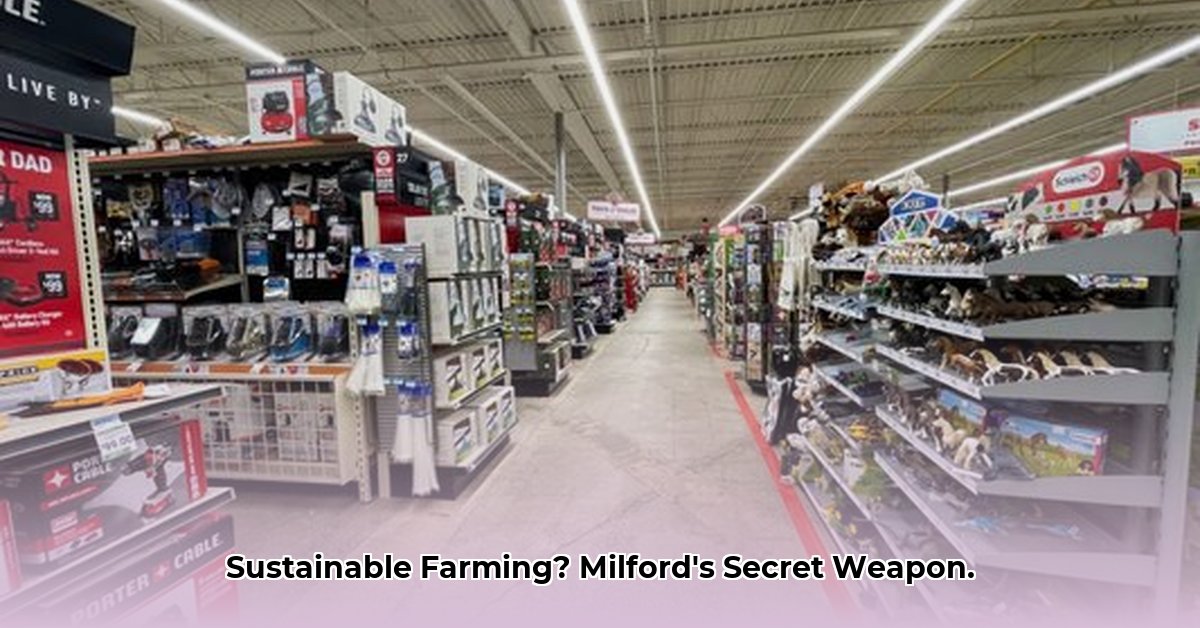
Tractor Supply's Product Offerings: Supporting Sustainable Practices
Milford, Pennsylvania's Tractor Supply store offers a range of products indirectly supporting sustainable agriculture. While not explicitly marketed as "sustainable," many items contribute to environmentally conscious farming and gardening. For example, the store stocks water-efficient irrigation systems (drip irrigation, for instance), helping farmers conserve precious water resources. Durable fencing materials minimize environmental impact from livestock straying, and high-quality animal feed supports healthy livestock with reduced waste. Furthermore, the store's gardening section offers seeds, soil, and tools compatible with organic gardening techniques. Even some lawn care products offer reduced or eliminated harsh chemicals. For more information on sustainable farming practices, see helpful resources like this site.
However, a critical aspect to consider is the volume of these sustainable products sold versus conventional alternatives. Data on sales figures of eco-friendly options is currently unavailable making it difficult to fully assess their contribution to sustainable agriculture. This lack of transparency prevents a comprehensive evaluation of Tractor Supply's actual impact.
Geographic Reach and Accessibility: A Convenient Resource
Tractor Supply's Milford location provides convenient access for farmers and gardeners throughout the surrounding area, including Matamoras and Montague. This accessibility is crucial for making sustainable practices feasible. Farmers can easily obtain necessary supplies, reducing transportation costs and time. However, mere proximity does not guarantee the adoption of sustainable practices; effective promotion and education are crucial. A key question remains: is the availability of sustainable products influencing purchasing decisions?
Limitations and Gaps: Addressing the Unknowns
While Tractor Supply offers products capable of supporting sustainable agriculture, the store's current role is limited by a lack of direct sustainability initiatives. There's no readily apparent evidence of large-scale educational programs or partnerships with local organic farms. Without concrete data on sales of eco-friendly products (organic seeds, natural pest control), a definitive assessment of their contribution to greener agriculture remains elusive. This information gap highlights the need for further transparency and investigation.
Actionable Steps for All Stakeholders: A Collaborative Approach
To significantly enhance sustainable agriculture in the Milford area, a multi-faceted approach involving all stakeholders is necessary.
For Tractor Supply Milford:
- Short-Term (1 year): Conduct thorough customer surveys to understand current and potential demand for sustainable products. Host workshops (at least one per quarter) on topics such as organic gardening, water conservation, and natural pest control. These workshops should be free and accessible to all members of the community.
- Long-Term (3-5 years): Develop partnerships with local organic farms to directly source and promote their products. Publish an annual sustainability report detailing sourcing practices, product sales related to sustainable agriculture, and efforts to minimize environmental impact.
For Local Farmers and Gardeners:
- Short-Term (1 year): Actively participate in Tractor Supply's workshops to learn about improving irrigation techniques and soil health. Seek out information on sustainable products and practices available through Tractor Supply and other resources.
- Long-Term (3-5 years): Collaborate with other farmers to share knowledge and best practices. Advocate for increased availability of sustainable agricultural products at local retailers, including increased selection and accurate labeling.
For the Milford Community:
- Short-Term (1 year): Support local environmental organizations promoting sustainable agriculture. Attend town hall meetings to advocate for policies fostering sustainable farming practices.
- Long-Term (3-5 years): Participate in community gardens and farmers' markets to promote sustainable practices and support local farmers directly. Engage in community composting programs and other environmentally minded initiatives.
Conclusion: Fostering a Sustainable Future Together
Tractor Supply's Milford location holds significant potential for advancing sustainable agriculture. However, realizing this potential requires a collective effort. Increased transparency from Tractor Supply, active participation from local farmers and gardeners, and conscious consumption choices from the broader Milford community are all essential components. By embracing collaboration and adopting sustainable practices, the Milford area can cultivate a thriving and environmentally responsible agricultural sector.